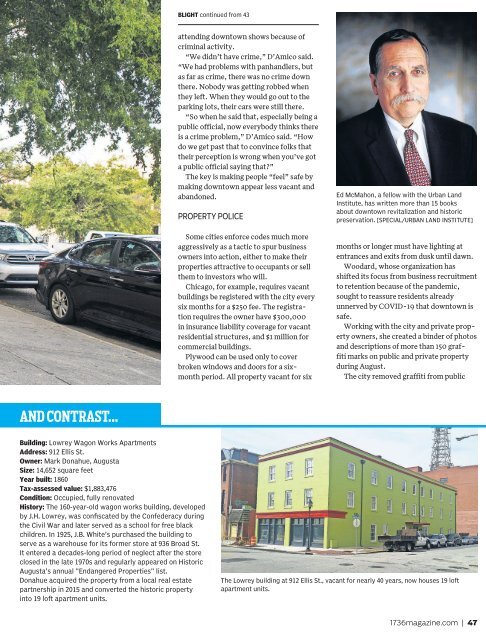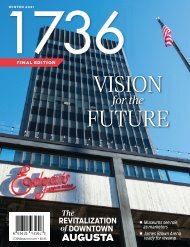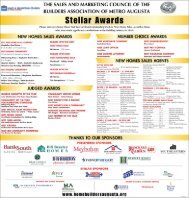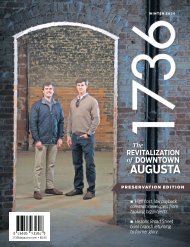Fall 2020 - 1736 Magazine
You also want an ePaper? Increase the reach of your titles
YUMPU automatically turns print PDFs into web optimized ePapers that Google loves.
BLIGHT continued from 43<br />
attending downtown shows because of<br />
criminal activity.<br />
“We didn’t have crime,” D’Amico said.<br />
“We had problems with panhandlers, but<br />
as far as crime, there was no crime down<br />
there. Nobody was getting robbed when<br />
they left. When they would go out to the<br />
parking lots, their cars were still there.<br />
“So when he said that, especially being a<br />
public official, now everybody thinks there<br />
is a crime problem,” D’Amico said. “How<br />
do we get past that to convince folks that<br />
their perception is wrong when you’ve got<br />
a public official saying that?”<br />
The key is making people “feel” safe by<br />
making downtown appear less vacant and<br />
abandoned.<br />
PROPERTY POLICE<br />
Some cities enforce codes much more<br />
aggressively as a tactic to spur business<br />
owners into action, either to make their<br />
properties attractive to occupants or sell<br />
them to investors who will.<br />
Chicago, for example, requires vacant<br />
buildings be registered with the city every<br />
six months for a $250 fee. The registration<br />
requires the owner have $300,000<br />
in insurance liability coverage for vacant<br />
residential structures, and $1 million for<br />
commercial buildings.<br />
Plywood can be used only to cover<br />
broken windows and doors for a sixmonth<br />
period. All property vacant for six<br />
Ed McMahon, a fellow with the Urban Land<br />
Institute, has written more than 15 books<br />
about downtown revitalization and historic<br />
preservation. [SPECIAL/URBAN LAND INSTITUTE]<br />
months or longer must have lighting at<br />
entrances and exits from dusk until dawn.<br />
Woodard, whose organization has<br />
shifted its focus from business recruitment<br />
to retention because of the pandemic,<br />
sought to reassure residents already<br />
unnerved by COVID-19 that downtown is<br />
safe.<br />
Working with the city and private property<br />
owners, she created a binder of photos<br />
and descriptions of more than 150 graffiti<br />
marks on public and private property<br />
during August.<br />
The city removed graffiti from public<br />
AND CONTRAST...<br />
Building: Lowrey Wagon Works Apartments<br />
Address: 912 Ellis St.<br />
Owner: Mark Donahue, Augusta<br />
Size: 14,652 square feet<br />
Year built: 1860<br />
Tax-assessed value: $1,883,476<br />
Condition: Occupied, fully renovated<br />
History: The 160-year-old wagon works building, developed<br />
by J.H. Lowrey, was confiscated by the Confederacy during<br />
the Civil War and later served as a school for free black<br />
children. In 1925, J.B. White's purchased the building to<br />
serve as a warehouse for its former store at 936 Broad St.<br />
It entered a decades-long period of neglect after the store<br />
closed in the late 1970s and regularly appeared on Historic<br />
Augusta's annual "Endangered Properties" list.<br />
Donahue acquired the property from a local real estate<br />
partnership in 2015 and converted the historic property<br />
into 19 loft apartment units.<br />
The Lowrey building at 912 Ellis St., vacant for nearly 40 years, now houses 19 loft<br />
apartment units.<br />
<strong>1736</strong>magazine.com | 47
















